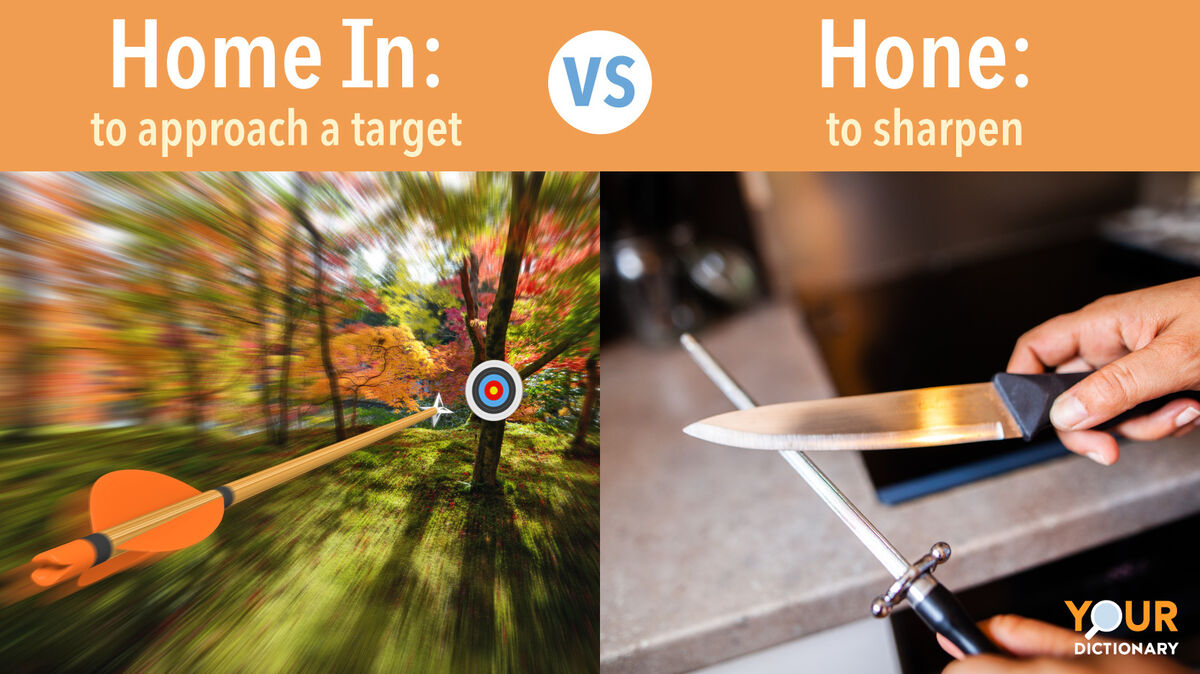
Are you homing in to a great idea, or are you honing in to it? Grammarians often have strong feelings about which phrase to use. Only one is correct — but you may be more likely to hear the other one in everyday conversation.
Should You Say Home In or Hone In?
Of these two phrases, only home in is correct. If that surprises you, take a look at the meanings of the verbs home and hone to determine which one makes more sense.
- home - to approach one's destination
- hone - to sharpen a skill
You can home in on a literal destination (such as the way a homing pigeon returns to its nest) or you can home in on an idea (such as homing in on a solution to a problem). When you hone something, you're sharpening it.
You Home In On a Target
The word home comes from the Old English word ham, meaning "dwelling place." It was a noun describing the place you live long before it was used as a verb meaning "to return home."
Home in is a phrasal verb that means "approaching a destination." When you home in on something, you're returning to your home. Figuratively, it means "to direct all of your attention" to one part of an idea.
Examples of sentences using home in include:
- The missile used radio signals to home in on the military target.
- After talking for an hour, we began to home in on a decision.
- Pearl homed in to our conversation about the wildfire.
- My dog quickly homed in to the squirrel in the tree.
Notice that home in is usually followed by a prepositional phrase that begins with the word on. The phrase specifies what the subject of the sentence is approaching.
Home In Means Zero In
Another phrasal verb, zero in, has a similar meaning to home in. It comes from military terminology to refer to aiming a weapon or concentrating firepower on a target. For example:
- The pilot zeroed in on the enemy aircraft.
- Our troops have zeroed in on the rebels' hideout.
Outside of the military context, zero in and home in have close enough meanings to be nearly synonymous in everyday conversation. You can home in on a great idea or the perfect parking space, and you can zero in on them as well.
You Hone a Skill
You only say hone in a sentence, not hone in. Hone in is an example of an eggcorn — a faulty phrase that sounds right, but isn't. More people tend to say hone in because both hone and in have the letter "n," making hone in easier to say. However, it's still incorrect.
The verb hone sounds like stone — and that's not a coincidence! It comes from the Old English word han ("stone") and refers to the stone with which you would sharpen a knife or sword. Today, hone can refer to literally sharpening an object, or it can refer to figuratively sharpening a skill. For example:
- If you practice archery every day, you'll really hone your abilities.
- The best way to hone writing skills is to write all the time.
- The fourth graders are honing their typing skills.
- Babies hone their talking skills by babbling before they say their first word.
Hone is a transitive verb, meaning that it's followed by a noun functioning as a direct object (usually a type of skill). You can't hone in something; you can only hone it.
Hone Your Word Choice — And Your Grammar
Once you've learned the difference between confusing word pairs such as home in vs. hone in, you'll be able to make your point more clearly. But using these types of phrases raises an important grammar question: should it be home in to or home into? Learn when to use in to vs. into with an easy-to-follow grammar guide.